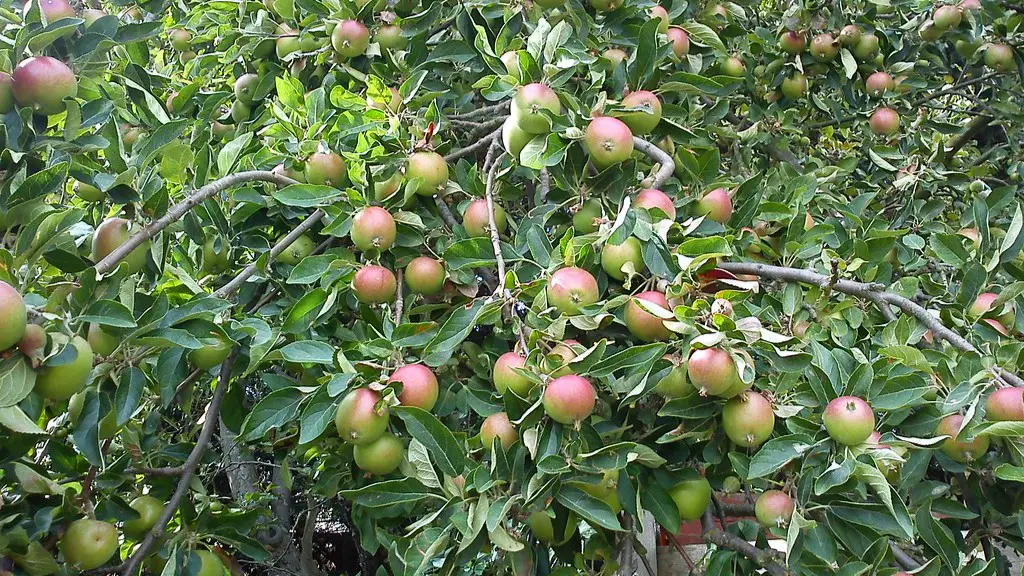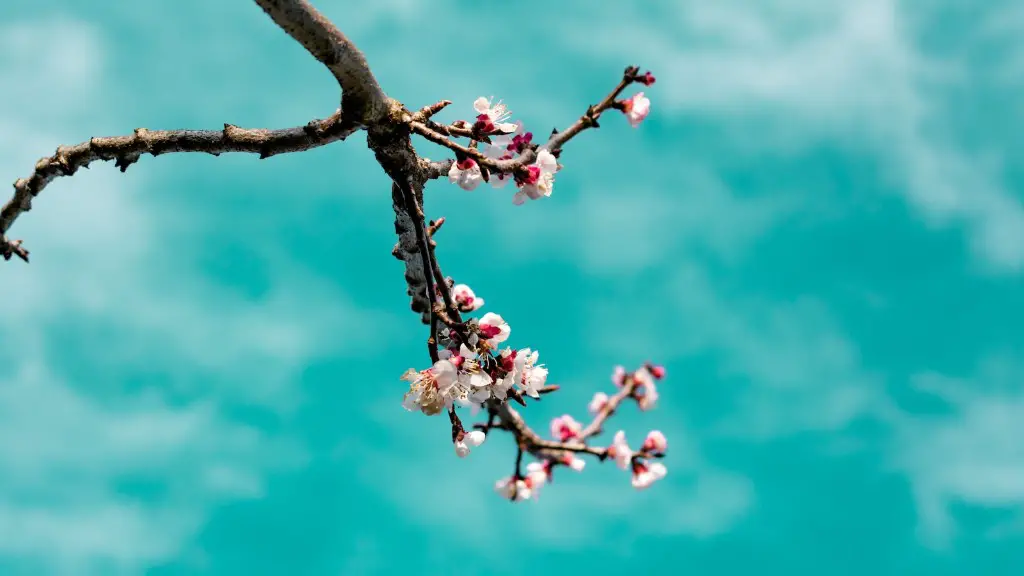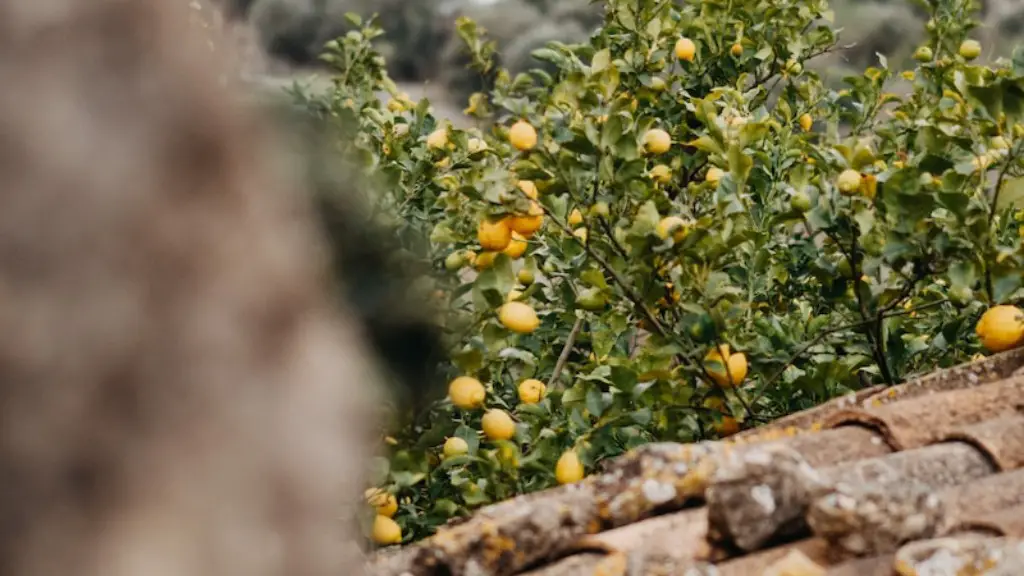Contrary to popular belief, apple trees rarely go through seasons completely devoid of bearing fruit. It is more likely that a variety of environmental and nutritional factors may be preventing your apple tree from bearing fruit this year. Poor soil fertility, insufficient soil moisture, lack of pollination, extreme temperatures, disease and pests can all be to blame.
Nutrition is a key factor in apple tree health. Adding organic matter–such as compost–to your soil can help supply important minerals, as well as aid in soil tilth and moisture retention. Applying a fertilizer specifically designed for apple trees during the dormant season may be necessary to correct nutrient deficiencies, and further improve the soil’s ability to supply the apple tree’s needs.
Pollination is another important factor in the production of a healthy apple crop. Adequate bee and other pollinator activity is essential for the pollination of apple trees. If pollinators are scarce or restricted, it may be necessary to manually pollinate the flowers of your apple tree.
In addition to nutrition and pollination, temperature fluctuations can affect your apple tree’s growth and development. Heavy frost during the tightly-clustered blooms of late spring can cause a significant set-back to the apple tree’s fruit harvest. Conversely, warm days followed by hard freezes can cause a rapid breakdown of the tissue of the young, immature fruits.
Insects and apple scab, a fungal disease, can also cause the apple tree to fail in its quest to bear fruit. Spraying fungicides and insecticides to control the impact of these pests can go a long way toward improving the overall health of the tree and likelihood of a successful harvest.
Finally, other problems such as damage to the flowers and young fruits, improper pruning and insufficient sun exposure can prevent fruit bearing.
Root Injury
Root injury is one of the most important factors when considering why an apple tree may have failed to bear fruit. From the effects of the mower, or from the removal of a root due to some maintenance work, root injury can quickly reduce the available vigor of the apple tree and can prevent it from ripening fruits.
Other issues that can contribute to root injury, such as poor drainage, soil compaction and construction damage, can also wreak havoc with the apple tree’s ability to bear fruit. Maintaining good drainage, avoiding compaction and protecting your tree’s roots are all essential for a successful harvest.
Planting Location
The location of an apple tree planting is also an important factor when considering why an apple tree may not have borne fruit this year. Extreme temperatures, intense wind, summer heat, and even conflicting root systems from one or more nearby trees can all be to blame.
It is often possible to ameliorate this problem by properly selecting the planting location. By planting in sunnier areas, pruning the nearby trees to provide more light and air to the apple tree, and selecting a site that is sheltered from windy conditions, you can significantly increase the chances of a successful crop.
Pruning
Over-pruning or improper pruning is another common factor causing an apple tree to fail to bear fruit. When too much of the tree is removed, the apple tree is unable to efficiently produce flowers and matures fruit.
Removing the correct branches and central leaders while pruning an apple tree is an important step in ensuring the tree’s health and fertility. It is also important to prune an apple as soon as possible after it has finished fruiting, and to avoid shearing or topping of the tree.
Extreme Temperatures
Extreme temperatures can take their toll on the apple tree and prevent it from bearing a crop. Periods of drought, alternated with sporadic rainy conditions, can have a considerable impact on the apple tree’s ability to produce fruit. In addition, extremely high temperatures can inhibit the ripening of the apple fruit.
Installing a simple irrigation system to ensure consistent soil moisture may be an important step in ensuring the apple tree’s health and consistency of yield. In addition, mulching around the base of the apple tree can help conserve moisture and protect its roots during warmer months.
Pollination
Pollination is key in the production of a healthy apple crop. While honey bees are some of the best pollinators, other insects are excellent pollinators and should be encouraged in your garden. Ladybugs, hover flies, bumblebees, and other beneficial insects can all play an important role in ensuring successful pollination. Placing bee houses and bee-friendly plants in close proximity to the apple tree will help encourage these beneficial pollinators.
Ensuring an adequate supply of pollen can also help increase the apple tree’s potential for fruit production. Providing an additional source of pollen by the planting of a variety of apple trees can help ensure successful pollination and an eventual harvest.
Sun Exposure
An inadequate supply of sunshine can also prevent the apple tree from bearing a healthy crop. Apple trees must be grown in a location that receives at least 8 hours of direct sunlight daily. Planting in an obscured location will impair the growth of the apple tree and reduce the chances of successful fruiting.
In addition to planting in an appropriately sunny location, pruning of the surrounding trees should be conducted to enhance the tree’s access to sunlight. To ensure maximum exposure, prune the branches of the neighboring trees and shrubs to a height of 8 feet above the ground.




